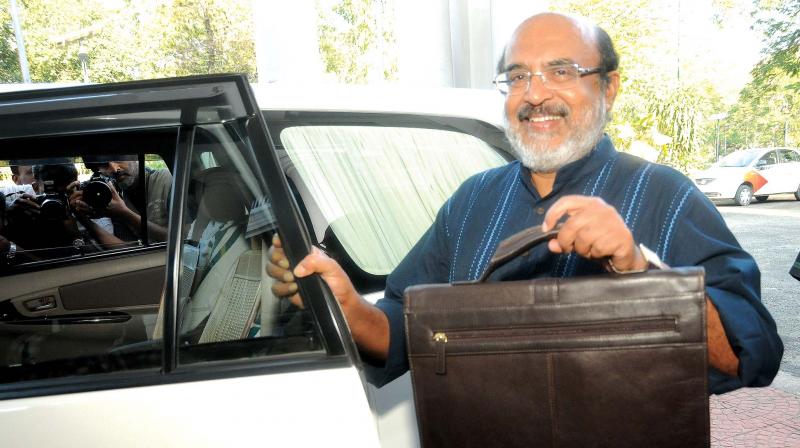Kerala budget 2017: Back to basics on wings of fiction

THIRUVANANTHAPURAM: That finance minister T.M. Thomas Isaac loves fiction was evident from the way in which he used M.T. Vasudevan Nair’s characters to throw light on the state’s problems. However, that Dr Isaac, a prolific writer of non-fiction, could produce some fiction of his own might come as a surprise. His first fiction was the scorn he had for Union finance minister Arun Jaitley for being so fiscally prudent. “We are witnessing the absurdity of presenting a Budget aimed at reduced expenditure during the time of recession,” he said about the Union Budget. “Why such fiscal orthodoxy,” he fumed, but has gone on to do the same thing. He has cut down the share of social and development services (education, health, agriculture) in development expenditure for 2017-18 from 90.04 to 89.38 per cent.
The total development expenditure for 2017-18 has not grown an inch. His capital expenditure for 2017-18, the fiscal push needed to improve demand at a time of recession, grows only by a paltry two percent; for 2016-17 the growth was 16.7 per cent. Yet, he speaks of the “highest investment project in the history of Kerala”. The figure is '35,000 crore for 2017-18. Such a gargantuan figure, Dr Isaac hopes, will be mobilised by his most epic creation, the money-generating genie called KIIF-B. Last year, while unveiling KIIF-B, Isaac said Rs 20,000 crore would be invested in the state in 2016-17. If the state is lucky, KIIF-B will release Rs 200 crore from its kitty, just one per cent of what was originally intended, by the end of this fiscal. Nonetheless, if KIIF-B manages to invest Rs 2,000 crore during 2017-18, the growth in capital expenditure will go up from the budgeted two per cent to 22 per cent.
So it has to be said, Dr Isaac has his heart in the right place. He wants to get the state’s fundamentals right. He wants more doctors, nurses, paramedical staff, cathlabs and dialysis units in government hospitals. He wants OPs to be patient-friendly, wants treatment provided at home, wants medicines for universal ailments like diabetes cholesterol and blood pressure to be provided free through primary health centres. He wants government schools to have buildings, toilets, playgrounds and computers. He wants local bodies to focus on implementation, to tackle issues like non completion of projects, inadequate coordination, lack of people's participation and corruption. But what is of concern is that it is on KIIF-B alone that Dr Isaac banks on for the creation of these basic services, the enjoyment of which Keralites have historically considered as a fundamental right.
How is the government planning to pay back? Will it have to introduce user charges? Will public education and health, when KIIF-B's repayment begins, move beyond the means of the poor? These are questions Dr Isaac has not answered. But one thing is clear. He wants to set the state’s finances in order. The compression of Budget expenditure, like Jaitley, is part of the consolidation. To his credit, Dr Isaac has also not behaved like a spoilt brat who spends way beyond his means knowing that a benefactor will bail him out. In Dr Isaac’s case, the benefactor is GST, which the finance minister estimates will improve tax revenue growth by 20 per cent. Though GST could potentially provide a cushion, Dr Isaac has cut down the growth in revenue expenditure from 20 per cent to 16 per cent. He has also put to the knife all expenditure other than the committed expenditures of salaries pensions and interests. So unlike MT's reckless Nair 'karanavars' who fill his iconic works.

